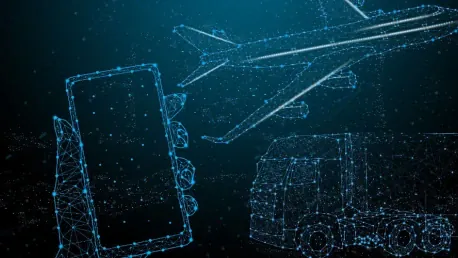In an ever-evolving world where the efficiency and reliability of supply chains are paramount, the logistics industry is being dramatically transformed by the integration of Internet of Things (IoT) and automation technologies. Contributing £185 billion annually to the UK economy and employing around 8% of its workforce, the logistics sector is integral for the smooth movement of goods both domestically and internationally. With trade volumes surpassing £1 trillion each year, the importance of leveraging advanced technologies cannot be overstated.
Real-time Tracking and Visibility
IoT sensors have revolutionized the ability to continuously monitor the location and condition of vehicles, containers, and packages. These sensors ensure compliance and provide protection for sensitive items, such as pharmaceuticals. Enhanced visibility allows logistics companies to act swiftly if issues arise, thereby reducing potential delays and safeguarding the quality and integrity of transported goods.
Efficient Inventory Management
One of the significant benefits of IoT in logistics is the automation of inventory tracking. IoT sensors minimize manual errors, and the data gathered is instantly accessible on cloud platforms. This instant access to data facilitates better forecasting and cost management, allowing companies to maintain optimal inventory levels and streamline their supply chain operations.
Predictive Maintenance
By equipping vehicles and equipment with IoT sensors, companies can monitor their health in real-time, predicting when maintenance is required. Predictive maintenance reduces unexpected breakdowns and prolongs the operational periods of vehicles. This not only saves money but also ensures that deliveries are made on time, increasing overall efficiency.
Optimized Route Planning
Cloud-based route planning, powered by IoT data, enables logistics companies to avoid traffic, save fuel, and reduce emissions. Optimized routes lead to quicker, more cost-effective deliveries that are also environmentally friendly. This integration of smart technology ensures that companies can meet delivery deadlines and enhances their competitive edge.
Enhanced Demand Forecasting
Combining IoT with cloud analytics allows companies to accurately predict demand surges, maintain optimal stock levels, and quickly identify new market trends. Enhanced demand forecasting ensures that logistics companies can meet customer needs efficiently, avoiding overstock or stockouts, and staying ahead of market changes.
Streamlined Collaboration
Cloud platforms enhance communication across the supply chain by enabling real-time data sharing among suppliers, distributors, and retailers. This transparency ensures that all parties are synchronized, improving overall efficiency and reducing the likelihood of costly errors. The streamlined collaboration fosters a cohesive and responsive supply chain.
Improved Customer Experience
Real-time tracking of shipments and personalized services contribute to a seamless experience for customers. Offering transparency and timely updates enhances customer satisfaction and loyalty. The ability to customize services based on data insights ensures that customers receive a tailored and exceptional service.
Enhanced Security
The combination of advanced cloud security measures with IoT monitoring capabilities provides robust protection against theft and cyber threats. Logistics companies can safeguard their assets and data, mitigating risks and ensuring the integrity of their operations. Enhanced security is essential for maintaining trust with customers and stakeholders.
David Ritchie, co-founder of Propel Tech, highlights the transformative impact of IoT on logistics, emphasizing that the integration of smart technology with customized software promotes higher efficiency and effectively meets customer needs. Tailored solutions that blend IoT and cloud platforms empower real-time decision-making and optimize operations uniquely suited to each business.
Conclusion
In a continuously changing world where the effectiveness and dependability of supply chains are crucial, the logistics industry is undergoing a significant transformation through the adoption of Internet of Things (IoT) and automation technologies. This sector, contributing £185 billion annually to the UK economy and employing about 8% of its workforce, is vital for ensuring the smooth flow of goods both within the country and internationally. With trade volumes exceeding £1 trillion each year, the necessity of using cutting-edge technologies is clear. The advent of IoT allows for real-time tracking and better management of assets, improving efficiency and reducing costs. Automation technologies streamline processes, increase productivity, and minimize human error. Together, these advancements enable the logistics sector to meet growing demands, enhance service quality, and maintain a competitive edge in a global market. Therefore, leveraging these innovations is essential for the future success and sustainability of the logistics industry.









